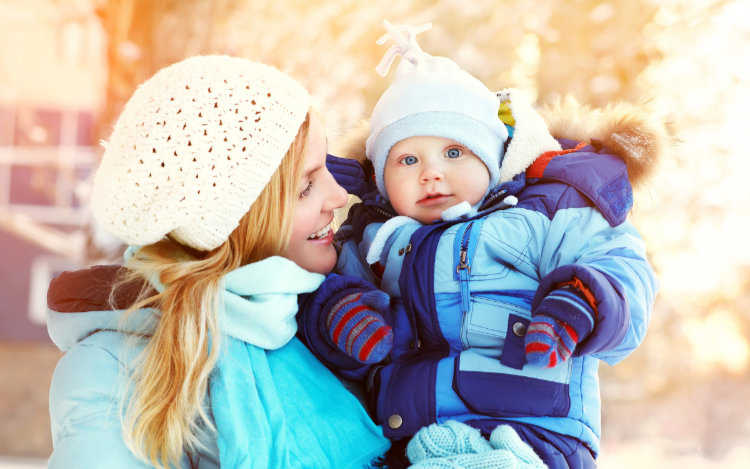As the cold weather approaches, there are lots of things new moms need to know about protecting their child and ensuring that baby’s first winter is a good one.
Protecting Infants During Cold and Flu Season
The seasonal shift marks more than just a change in the weather. During the winter months, there is an annual spike in illnesses, which is a minor inconvenience for most of us.
However, for newborns (and any child under two), a little cold can become a big deal. That’s because their immune systems aren’t fully developed. Since your child’s immune system will struggle to fight off illnesses, they’re at risk for serious health issues, especially if they were born prematurely.
What is RSV, and Why Does It Matter?
One of the most common illnesses among babies is RSV—it’s so common that your baby is bound to contract it before age two. But, for your baby’s first winter, you want to do everything possible to ensure they don’t catch this common illness.
RSV is serious, and there’s no current treatment. So, if your little one contracts it, you’ve got to let it run its course. However, if you do notice the signs of RSV, take your baby to the pediatrician or ER immediately.
Symptoms of RSV include:
- coughing
- incessant wheezing
- lethargy
- fast or troubled breathing
- bluing skin tone
- high fever (100.4 °F for infants under three months and 102.2 °F for other children)
To avoid complications, here are some prevention tips to protect your child during their first winter:
- ensure that guests wash their hands before touching your baby
- wash toys, sheets, and blankets frequently
- avoid large crowds
- keep your baby away from people you suspect or know are sick
Treating a Cold During Baby’s First Winter
Prevention is key, but it’s unrealistic to think that your baby will pass through their adolescence without ever getting sick.
So, if—and when—your baby gets sick, you want to be prepared. Here’s a list of baby health winter essentials to keep at home:
Never give your infant cough or cold medicine. OTC medications can be extremely dangerous to your child.
How to Keep Your Baby Warm Through Their First Winter
Now that you know the basics of keeping your baby healthy through their first winter, it’s time to consider how to keep them warm.
November through March are the months when you want to be especially considerate of how warm your baby is. Whether you’re running a quick errand or planning to spend a long time outside, keeping your baby well-dressed is essential for their comfort and safety.
Dressing Your Baby in Layers
A good rule of thumb for dressing a baby during winter is to dress them in one additional layer than what you would normally wear.
So, if it’s chilly outside and the perfect weather for a long sleeve shirt and a warm sweater, give your baby three layers—like a onesie, pants, a jacket, a hat, and a blanket.
For colder days, here’s how you can dress your baby:
- Snug pants, like leggings or a bodysuit
- An extra layer of warm pants, like sweatpants, jeans, or snow pants
- A long sleeve shirt (plus a short sleeve tee, if needed)
- A jacket
- A snug hat (make sure your baby’s head is always covered in cold weather)
- Mittens
- Winter booties
Keeping Your Baby Warm at Night
When it’s time to sleep, your baby needs a way to stay warm in their crib. Since blankets are not recommended to babies under one (due to the risk of suffocation), you’ll need some alternatives.
Consider:
- fleece onesie pajamas
- sleep-sacks
- dressing in layers as you would outside
- turning up the heat in your home
How to Keep Your Baby Safe and Warm in the Car
Since it’s baby’s first winter, this might be the first time you’re navigating car seats and puffy winter jackets.
What lots of moms don’t know is that buckling a baby into a car seat with their jacket on is a safety hazard.
Buckling your kid into a car seat with their jacket still on significantly reduces the effectiveness of the car seat.
Instead, take their coat off once you get to the car. Or, simply wrap them up in a blanket to transport them from the house to the car.
Maintaining Healthy Skin During Baby’s First Winter
It’s no secret that babies have, well, baby-soft skin. If you suffer from dry skin during the winter months, then you can probably predict that your child is going to have an even harder time.
Here are some tips for keeping their skin healthy:
- moisturize sensitive skin with baby lotion each day
- use a healing ointment as a preventative measure or to treat dry skin (Aquaphor and Sudocrem are both great options)
- keep them hydrated (for infants under six months, hydration should only come from formula or breast milk)
- avoid bathing them too often (more than once every two days), too long (more than 10 minutes), or in hot water (over 100°F)
If you’re looking for an OBGYN in the Cincinnati area or seeking further guidance on prenatal vitamins and other prenatal nutrition, call us at 513-241-4774, or schedule your appointment.
